For a better future, study the past.
For a better future, study the past.
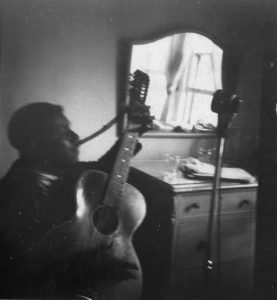
William Samuel McTier (McTear) was born in Thomson, Georgia on May 5, 1898, though some researchers contend that he was born in 1903, and his headstone gives the year of 1901. I have yet to find a source on how he became known as McTell. It is also unclear if young Willie was born blind or lost his sight during childhood. The New Georgia Encyclopedia indicates McTell attended schools for the blind in Georgia, New York, and Michigan. Whatever the origins of his name, Blind Willie McTell of Thomson, Georgia is a legendary blues guitarist with a deep influence in the genre.
While in his teens, McTell and his mother moved to Statesboro, GA, and it was here where Willie learned to play the six-string guitar.
By the 1920s, McTell had left the family home, taking to the road as a traveling musician, playing carnivals, bars, parties, churches, and street corners to earn a living.
Young and talented, McTell became popular in Atlanta, regularly playing at house parties and similar events. By this time, he had upped his game to the twelve-string guitar, an instrument that helped him project his music better in the crowded areas he often played.
By 1927, recording companies had noticed McTell and other blues musicians and he cut his first tracks for Victor Records, following that with a 1928 session for Columbia. The New Georgia Encyclopedia lists multiple studios that McTell recorded for, often under different names. Musicians of the era would often record under similar, but different, names in order to avoid contract conflicts.
McTell was wed to Ruth Kate Williams in 1934. They were to later record several tracks together.
John A. Lomax recorded McTell as a part of the Archive of American Folk Song in 1940. These recordings, held by the Library of Congress, have been released under the title The Complete Library of Congress Recordings.
Commercially, McTell’s sales were declining during the 40s, and he found himself playing more on the streets. He did record for Atlantic Records in 1949 and Regal Records the same year. Atlanta record store owner Edward Rhodes made McTell’s final known recordings in 1956.
Starting in 1957, McTell served as the preacher at Mount Zion Baptist Church in Atlanta and devoted himself to religious music. Blind Willie was to only live a short time longer and passed away on August 19, 1959, due to a cerebral hemorrhage. McTell is buried in Jones Grove Baptist Church Cemetery in Thomson, Georgia.
Located in the downtown Thomson, GA area is a public art exhibit titled McTell’s 12-String Strut, honoring the locally born Blind Willie McTell. There are twelve, seven-foot-tall Stella guitars in the installation, each painted by a different artist. The guitar models were created by Icon Poly Studio and are made of polyurethane.
The installation was presented to the public in 2016 after a Georgia Department of Economic Development report suggested a public art component and providing additional exposure for one of McDuffie Counties most recognized citizens as part of the county’s tourism marketing efforts.
Below, find images of 6 of the 12 guitars that are located throughout Thomson. 11 of these are very easy to find. The 12th however took a bit more digging. It is located outside the McDuffie County Government complex.
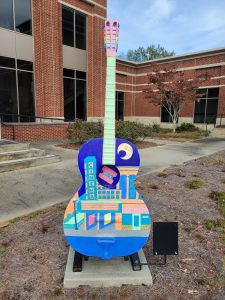

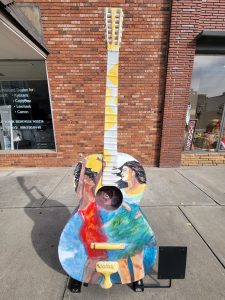
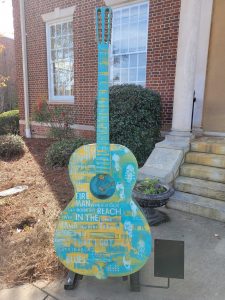
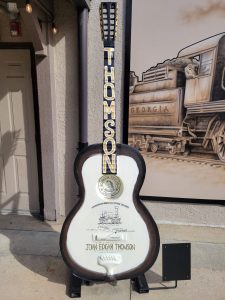
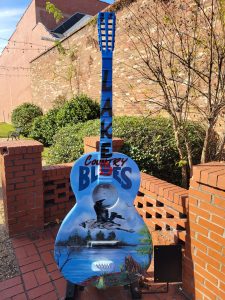

The Blues Hall of Fame inducted Blind Willie in 1981 and in 1990, the Georgia Music Hall of Fame bestowed the same honor.
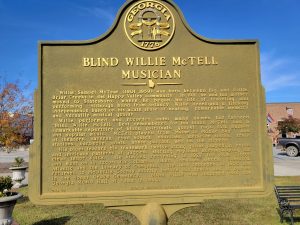
A Georgia Historic Marker was unveiled in Thomson, GA, in 1993, near the old railroad station. The marker honors McTell and his legacy. The text (including a few small grammatical errors) reads as follows
Willie Samuel McTear (1901-1959) was born between Big and Little Briar Creeks in the Happy Valley Community. In 1911, he and his mother moved to Statesboro, where he began his life of traveling and performing. Although blind from infancy, Willie developed a lifelong independence based on his acute sense of hearing., remarkable memory and versatile musical genius.
Willie performed and recorded under many names but favored “Blind Willie” McTell. Best remembered for his blues, McTell, had a remarkable repertoire of blues, spirituals, gospels, rags, fold ballads and popular music. McTell played from “Maine to Mobile Bay”, and at theaters, taverns, road houses, churches, medicine shows, train stations, barbecue joints, house parties, and on the streets.
His blues feature his trademark twelve-string guitar played in rapid and intricate patterns of jagged, shifting rhythms accompanying his clear tenor voice. He started recording in 1927 for RCA Victor Atlantic and the Library of Congress. He last recorded in 1956 and returned to McDuffie County shortly before his death. Blind Willie McTell is buried in Jones Grove Cemetery. The Georgia Music Hall of Fame inducted Blind Willie in 1990.
McTell has also played a considerable influence on musicians after him. Performers as diverse as Taj Mahal, the Allman Brothers Band, Ry Cooder, Jack White, and Bob Dylan have covered his songs or singled out the blind guitar player for his influence on their careers.
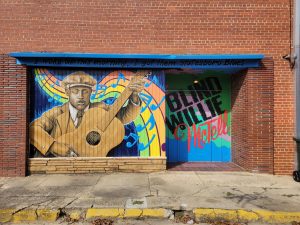
Each year the Blind Willie McTell Music Festival, held in Thomson, GA, celebrates the legacy of blind guitar player. Ticket prices for the event seem quite reasonable. The lineup for 2022 included Jimmie Vaughn, the Texas Gentlemen, Joachim Cooder (son of the legendary Ry Cooder), and more. For more information on the festival check their website.
Sources:
Burditt, Erin. “Guitars are Back.” The McDuffie Progress. April 13, 2021.
Jacobs, Hal. ““Blind Willie” McTell.” New Georgia Encyclopedia, last modified Jun 1, 2020.

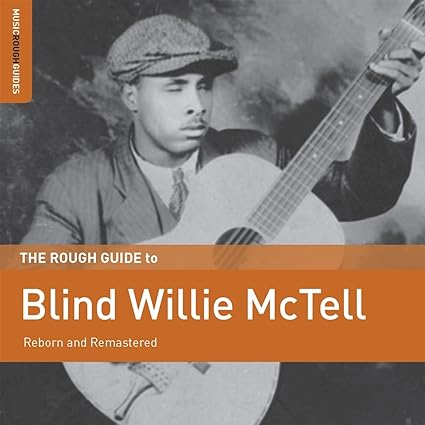 The Rough Guide to Blind Willie McTell is an excellent introduction to the genius that poured from his fingers. It contains 25 key tracks including some of his best known such as Statesboro Blues. There is no full length biography on the life of Blind Willie McTell.
The Rough Guide to Blind Willie McTell is an excellent introduction to the genius that poured from his fingers. It contains 25 key tracks including some of his best known such as Statesboro Blues. There is no full length biography on the life of Blind Willie McTell.